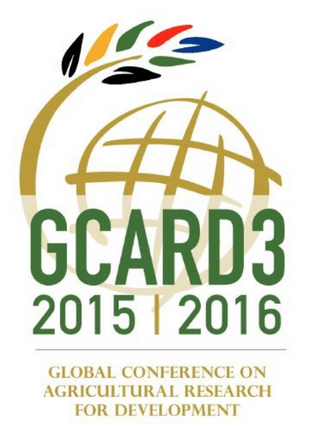The 3rd Global Conference on Agricultural Research for Development (GCARD3) adopted an outcome statement to guide the work of partners and stakeholders on agricultural research and food systems and to align research activities with the Sustainable Development Goals (SDGs) as well as the priorities of countries.
 8 April 2016: The 3rd Global Conference on Agricultural Research for Development (GCARD3) adopted an outcome statement to guide the work of partners and stakeholders on agricultural research and food systems and to align research activities with the Sustainable Development Goals (SDGs) as well as the priorities of countries.
8 April 2016: The 3rd Global Conference on Agricultural Research for Development (GCARD3) adopted an outcome statement to guide the work of partners and stakeholders on agricultural research and food systems and to align research activities with the Sustainable Development Goals (SDGs) as well as the priorities of countries.
Held under the theme ‘No One Left Behind: Agri-food Innovation and Research for a Sustainable World,’ GCARD3 was the culmination of a two-year consultative process involving a wide variety of stakeholders in agriculture and food systems. It aimed, among other objectives, to support: mutual learning; alignment of research of the CGIAR Consortium with national and regional priorities; to explore new types of collaboration and strengthen partnerships; and catalyze discussions on changes needed in national agricultural innovation systems.
The conference developed a set of 17 collective actions under five themes. On scaling up the impact of research, actions include investment in capacity building focusing on youth and policy making, and embedding research into innovation systems. On showcasing results and demonstrating impact, actions include contributing to national measurements of progress towards the SDGs, building capacity for integrated measurements, and creating a platform to harmonize agriculture-related indicators.
Actions to keep science relevant and future-focused include reforming education programmes in 100 universities and creating 1000 additional PhD positions a year for future-relevant agricultural research. Actions agreed to sustain the future of farming include clustering smallholder farmers to improve participation, building value chain partnerships, protecting small framers’ access to resources, building farmers’ business skills, and developing open innovation platforms for access to new technologies. On ensuring better rural futures, participants agreed to establish foresight platforms and to collectively plan, design and implement initiatives to achieve a desired future.
The outcome statement also specifies three implementing principles, which commit: national partners to work with rural communities to address capacity needs and constraints in innovation systems; the CGIAR Consortium and other international research systems to actively engage with national agricultural systems to deliver on national development objectives; and public, private and civil partners to find new ways of combining finance and capacity development through community-driven, nationally-led and regionally and internationally-supported mechanisms.
The Conference also included the Global Forum on Agricultural Research (GFAR) Partners’ Assembly, which discussed collective actions, mechanisms and governance for GFAR, and established GFAR’s new Charter. Other conference activities included a one day research symposium celebrating the 25th anniversary of the Agricultural Research Council of South Africa (ARC), as well as visits to field trial sites and the ARC Biotechnology Platform.
GCARD 3 convened 5-8 April 2016, in Boksburg, South Africa, hosted by ARC, and co-organized by the CGIAR Consortium and GFAR. The event was preceded by national and regional multi-stakeholder consultations in 2015 and early 2016 aimed at realigning research needs and priorities with countries’ own development needs and with the SDGs. The conference was attended by more than 500 participants from 83 countries representing farmers’ groups, science and research organizations, education and extension services, development agencies, civil society and the private sector. [CGIAR Press Release, 11 April 2016] [CGIAR Press Release, 5 April 2016] [GCARD3 Website] [GFAR Press Release] [GFAR Blog on GCARD3] [GFAR Charter] [IISD RS Coverage of GCARD3]